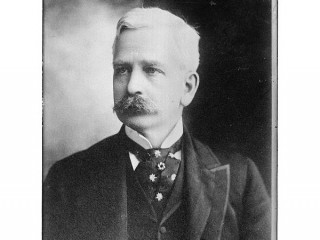
Marshall Field biography
Date of birth : 1834-08-18
Date of death : 1906-01-16
Birthplace : Conway, Massachusetts, U.S.
Nationality : American
Category : Arhitecture and Engineering
Last modified : 2011-10-19
Credited as : merchant, department stores, Marshall Field and Company
The American merchant Marshall Field established one of America's first innovative wholesale and retail dry-goods businesses.
The son of a farmer, Marshall Field was born near Conway, Mass., and attended local schools until he was 17. He clerked in a dry-goods store in Pittsfield, Mass. In 1856 he went to Chicago, where he worked for Cooley, Wadsworth and Company, a wholesale dry-goods firm, in 1861 becoming the general manager and a partner. In 1864 Levi Z. Leiter, a large-scale real estate operator, joined the company as a silent partner. When Potter Palmer, an entrepreneur and real estate developer, joined his dry-goods business with Field's and Leiter's, the company became Field, Palmer and Leiter. When Palmer retired in 1867 and Leiter in 1881, the organization became Marshall Field and Company, owned almost entirely by Field and run directly by him. Field was in fact the source and inspiration of the ideas that revolutionized retail selling everywhere.
The Field enterprise was highly diversified. It sold wholesale dry goods through a sales force reaching small stores all over the Midwest; manufactured dry goods in factories in the British Isles, France, and elsewhere; had its own buying offices all over the world; and operated its retail department store, Marshall Field and Company, in Chicago. When Field died on Jan. 16, 1906, the store covered some 36 acres over 11 Chicago blocks, the largest establishment of its kind.
As a merchant, Field was responsible for many innovations. He introduced the one-price system, bought and sold for cash, and permitted exchange of goods. The reliability of his store was well known. Various customer services were also initiated or early adopted by Field: restaurants, personal shoppers, home delivery, an interior decoration department, and a bargain basement. His sales grew from $12 million annually in 1868 to $25 million in 1881 and $68 million in 1906.
Meanwhile, Field pushed the development of downtown Chicago, so that when he died, half of his fortune, estimated to be between $100 million and $150 million, was in Chicago properties. He wished to make Chicago a great educational and cultural center and gave large sums to various institutions. He helped found the Art Institute, donated the land on which the first buildings of the University of Chicago were erected, and contributed $1 million for the museum at the World's Columbian Exposition. This museum became Field's chief interest; in addition to gifts during his lifetime his $8-million bequest built the Field (later Chicago) Museum of Natural History.
















